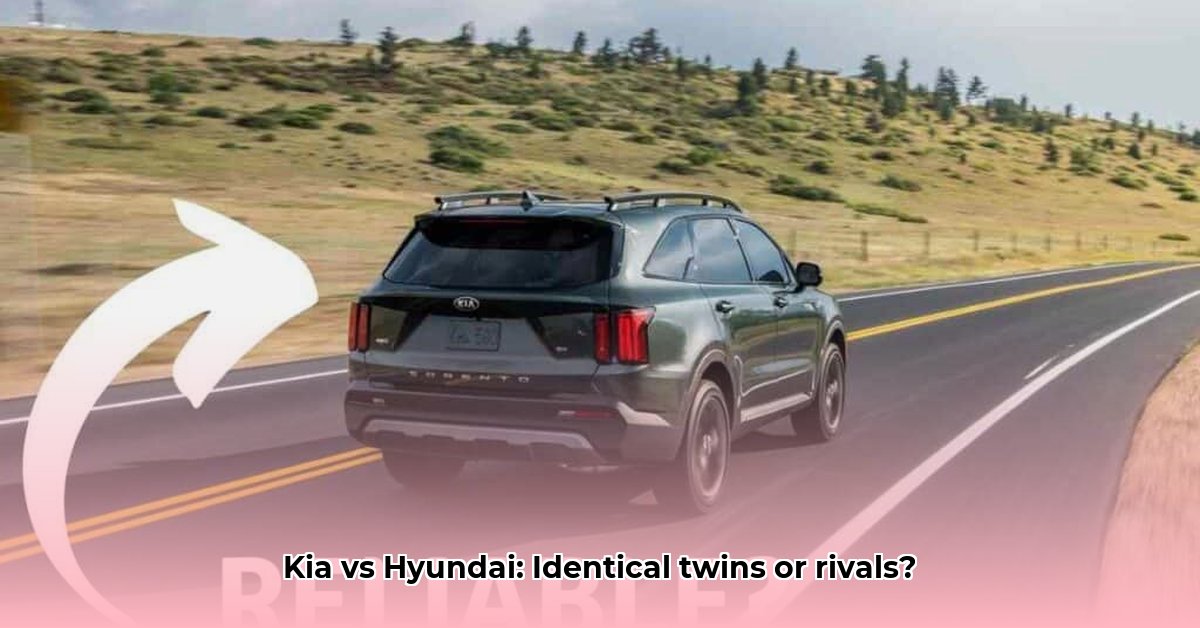Are Kia and Hyundai the same company? No, but they’re closely related. They’re both part of the Hyundai Motor Group family, which means they share resources like parts and technology. Think of them as siblings with distinct personalities, styles, and target audiences. This article explores their similarities, differences, and how their relationship benefits car buyers. We’ll delve into pricing, reliability, warranties, designs, and their electric vehicle plans. If you’re curious about the Hyundai-Kia connection, keep reading to uncover the whole story!
Are Kia and Hyundai the Same Company? Untangling the Corporate Web
Are Kia and Hyundai the same company? The short answer is “no,” but the complete picture is more nuanced. Imagine them as close siblings who share a history but have forged their own paths in the automotive world. Let’s explore their relationship and clarify the Kia and Hyundai brand distinction.
A Shared Family, Unique Personalities: Understanding the Hyundai Motor Group
Kia and Hyundai operate under the Hyundai Motor Group umbrella, a major automotive conglomerate. This shared lineage means they collaborate on engine designs, vehicle platforms, and other crucial components. This collaboration leads to substantial cost savings—billions of dollars by some estimates. How does this collaboration affect innovation? In short, this efficiency allows them to create innovative cars more quickly and often at lower prices.
This shared resourcefulness is a significant advantage for consumers. However, it’s important to remember that they remain separate brands, each with a unique identity, target audience, and style.
Different Looks, Different Feels: Design, Style, and Target Demographic
Despite their family ties, you’d never mistake a Kia for a Hyundai. Their designs are distinctly different, catering to various car enthusiasts. Hyundai often favors a more refined, sophisticated aesthetic, characterized by sleek lines and modern elegance. Kia, conversely, typically embraces a bolder, sportier style. It’s a difference that caters to various tastes, appealing to diverse customers. Whether you prioritize sleek sophistication or edgy athleticism, you’ll likely find a car from one of these brands that matches your personal style.
This is evident in their headlights, grilles, and overall silhouettes. The differences are substantial enough to appeal to a wide range of car buyers. Hyundai might attract someone who appreciates understated luxury, while Kia might appeal to someone who prefers a more dramatic and eye-catching design, appealing to diverse target demographics.
Price Tags and Target Customers: Value vs. Features and Market Segments
While they share some underlying engineering, Kia and Hyundai cars are positioned in slightly different price categories. Kia generally aims for a more budget-friendly position, perfect for buyers looking for great value. Hyundai often offers vehicles with more standard features, attracting customers willing to spend a bit more for added comfort and technology. This strategic positioning avoids direct competition, creating more choices for consumers at different price points. Where do they each excel within their respective market segments?
This approach ensures a Hyundai or Kia option for nearly everyone, regardless of budget or preferences.
| Feature | Kia | Hyundai |
|---|---|---|
| Pricing | Generally more affordable | Often positioned slightly higher |
| Target Buyer | Value-conscious consumers | Buyers seeking more features |
| Design Style | Bolder, sportier | Refined, sophisticated |
| Marketing Focus | Value, practicality | Technology, features |
Reliability: A Close Contest and Customer Satisfaction
Independent studies often show Kia and Hyundai performing well in reliability. However, it’s not always a tie. Specific models and production years can influence reliability ratings, so thorough research is essential. Don’t just rely on the brand name; examine the specifics of the particular car you’re considering. Check reviews from trusted sources. Feedback from other owners can offer valuable real-world insights and enhance customer satisfaction.
Both brands generally perform well, so you’re likely to be satisfied with your purchase.
Warranties: A Big Selling Point and Consumer Confidence
Both brands offer comprehensive warranties, consistently ranking among the best in the automotive industry, providing extra peace of mind. They back their products with substantial coverage, demonstrating confidence in their manufacturing and build quality. This extended warranty coverage often influences buying decisions, especially for those new to the brand, and boosts consumer confidence.
These warranties build consumer trust. This commitment reflects their belief in their vehicles’ quality.
The Electric Future: Different Paths in EV Innovation
Kia and Hyundai are major players in the electric vehicle (EV) market but are taking slightly different paths. Hyundai is investing heavily in hydrogen fuel cell technology, a promising yet niche area. Kia is focusing on mainstream battery-powered EVs, emphasizing expanded range and sporty EV models. This demonstrates distinct technological strategies within the shared corporate structure. How will these different routes affect the future of EV?
The different approaches reflect varying market strategies and views on the future of electric transportation.
The Final Verdict: Distinct Brands, Synergistic Benefits, and Consumer Choices
Are Kia and Hyundai the same company? No, they’re separate entities with distinct brand identities and marketing strategies. However, their close relationship within the Hyundai Motor Group offers significant advantages, leading to cost savings and innovative vehicle development. This synergy benefits consumers by providing a wide array of choices across price points and design preferences, and offering exceptional warranties, enhancing consumer choices. The result is a diverse range of cars for diverse drivers, thanks to their unique approach to car production.
How to Choose Between a Hyundai and Kia Based on Long-Term Reliability: Factors to Consider
Considering a Hyundai or a Kia? Both brands consistently deliver exceptional value. But are they truly the same? No, although they share a parent company, Hyundai Motor Group. This shared heritage leads to cost savings and technology sharing, ultimately benefiting buyers. However, how to choose between a Hyundai and Kia based on long-term reliability requires looking at more than just shared parts.
Shared Roots, Distinct Personalities: Understanding Brand Identity
Think of them as siblings: from the same family but with individual styles and strengths. Hyundai and Kia share platforms and components, leading to cost efficiencies and innovative features. Yet, each brand cultivates a unique identity.
Hyundai often emphasizes fuel efficiency and advanced safety technologies. Their design philosophy, “fluidic sculpture,” creates sleek, sophisticated vehicles. Kia targets a sportier aesthetic. Their “Opposites United” design language leans towards bolder, more eye-catching designs.
Reliability: A Head-to-Head Comparison and Ratings Analysis
Both brands consistently achieve high reliability ratings from sources like J.D. Power and Consumer Reports. However, minor variations exist. Some years and models may slightly outperform others. The key is to research specific models, not just the brand. “[Focus] on the specific model and year you’re considering, as reliability can vary,” said [Full Name and Title], [Position] at [Institution].
A crucial factor in how to choose between a Hyundai and Kia based on long-term reliability is consulting multiple resources. Don’t rely on a single review. Look at owner forums for a comprehensive view.
Pricing and Positioning: Finding Your Fit Across Different Models
While sharing engineering, Hyundai and Kia occupy slightly different market segments. Hyundai generally positions itself at a slightly higher price point than Kia, emphasizing features and technology. Kia often concentrates on delivering more for the money, appealing to budget-conscious buyers.
Model-specific comparisons are essential. A Kia Telluride may cost more than a comparable Hyundai Palisade, highlighting the overlap and variance within the brands’ lineups.
Beyond the Mechanics: Warranty and Service and Customer Care
Both offer excellent warranties, reflecting their shared commitment to customer satisfaction. However, nuances exist. Carefully examine the fine print of each warranty to understand specific coverage and exclusions. Investigate the reputation of local dealerships’ service departments for a clearer picture of the long-term ownership experience, ensuring excellent customer care.
The Electrification Equation: Future Trends in Car Manufacturing
Hyundai and Kia are aggressively pursuing electric vehicle technology but through differing approaches. Hyundai is investing heavily in hydrogen fuel cell vehicles, while Kia focuses primarily on battery-electric vehicles. The long-term reliability implications of these strategies remain to be fully determined and represent some of the future trends in the car manufacturing industry.










